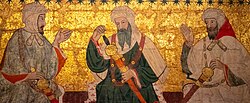Banu Hud

| Historical Arab states and dynasties |
|---|
 |
The Banu Hud (
In 1039, under the leadership of
Despite their independence, the Banu Hud were forced to recognize the superiority of the kingdom of Castile and pay parias to it as early as 1055.[3] In 1086, they led the smaller kingdoms in their resistance to the Almoravids, who did not succeed in conquering Zaragoza until May 1110. The conquest represented the end of the dynasty. The last of the Banu Hud, Imad al-Dawl Abd al-Malik (Abdelmalik) Al Hud, the last king of Zaragoza, forced to abandon his capital, allied himself with the Christian kingdom of Aragon under Alfonso the Battler,[4] who in 1118 reconquered the city for the Christians and made it the capital of Aragon.[5]
The last king's son, Zafadola (Sayf al-Dawla), had some territorial authority before being killed by Christians during a battle.[1]
Between 1228 and 1237, most of al-Andalus was controlled by Ibn Hud, who claimed descent from the Banu Hud.[6]
See also
- Taifa of Zaragoza
- Taifa of Seville
- Taifa of Cordoba
- The Reconquista (8th–15th century)
Notes
- ^ ISBN 978-1-317-87041-8.
Sayf al-Dawla was the son of the last Hūdid ruler of Zaragoza, deposed by the Almoravids in 1110.
- ^ "Discover Islamic Art - Virtual Museum - monument_isl_es_mon01_4_en". www.discoverislamicart.org. Retrieved 2017-08-25.
- ISBN 9004103678.
- Abbot Suger, is conserved in the Louvre. The mounts are inscribed with the vase's provenance. It owner Mitadolus was not identified as Imad al-Dawl until 1993 (George T. Beech, "The Eleanor of Aquitaine Vase, William IX of Aquitaine, and Muslim Spain" Gesta 32.1 (1993), pp. 3-10). It appears to have been a gift to William IX of Aquitaine about this time, in hopes of securing his support.
- ^ Ramiro I expelled the Almoravids from the mid-Ebro valley under his extended control.
- ^ Kennedy 2014, p. 268.
